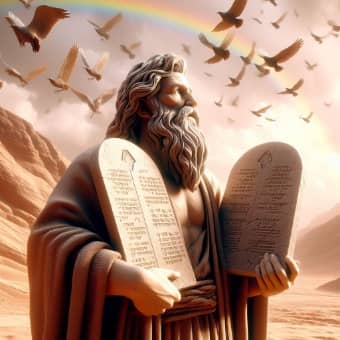The Book of Exodus
A Comprehensive Guide
The Book of Exodus is the second book of the Hebrew Bible and the Old Testament. It narrates the liberation of the Israelites from slavery in Egypt through the guidance of Moses, their journey through the wilderness, and the establishment of the covenant with God at Mount Sinai.

Historical and Cultural Context
The events in the Book of Exodus are believed to have occurred in the 15th century BCE. The narrative provides valuable insights into the culture, traditions, and religious beliefs of the ancient Israelites.
This blog post contains affiliate links. When you click on a link on this page and make a purchase I may earn a small commission, at no additional cost to you. Thank you for your support.
Key Themes and Significance
Liberation and Freedom
Exodus is a story of liberation and freedom, portraying the struggle of the Israelites against oppression and their eventual deliverance. It symbolizes hope and the triumph of good over evil.
Covenant and Law
The covenant between God and the Israelites, particularly the giving of the Ten Commandments, is a pivotal moment in the book. It lays the foundation for religious and ethical principles that have significantly influenced Judeo-Christian traditions.
Divine Presence
The presence of God is a recurring theme in Exodus, manifested through various phenomena such as the burning bush, the pillar of cloud and fire, and the establishment of the tabernacle. These manifestations underscore the intimate relationship between God and the Israelites.
Characters
Moses
Moses is a central figure in the Book of Exodus. His leadership, resilience, and close relationship with God are instrumental in the liberation of the Israelites. His role as a lawgiver and mediator between the people and God shapes the theological framework of Judaism.
Pharaoh
The oppressive rule of the Pharaoh symbolizes tyranny and the abuse of power. The confrontations between Moses and Pharaoh highlight the clash between divine authority and human arrogance.
Aaron
Aaron, Moses’ brother, plays a supportive and complementary role throughout the narrative. He becomes the first High Priest of the Israelites, representing continuity and religious leadership.
Literary Style
Exodus employs various literary forms including historical narrative, poetry, and legal prescriptions. Its vivid imagery, dramatic events, and powerful speeches contribute to its enduring impact.
Relevance Today
The themes of freedom, divine presence, and ethical responsibilities explored in Exodus continue to resonate with contemporary audiences. The book’s reflections on justice, human rights, and resilience are particularly significant in today’s global context.
In conclusion, the Book of Exodus stands as a profound account of faith, liberation, and divine intervention. Its enduring legacy continues to inspire and provoke contemplation on the human experience and the pursuit of a meaningful existence.
Delve Deeper into the Word with the ESV Study Bible
Uncover the rich depths of Scripture with the ESV Study Bible. This comprehensive resource features insightful commentary, helpful study notes, and beautiful illustrations to enhance your understanding of God’s Word. Perfect for serious Bible students and casual readers alike, this Bible will equip you to grow in your faith and deepen your connection with God.
Click the link to purchase your copy of the ESV Study Bible and embark on a journey of spiritual discovery.
Highlight Your Journey: Essential Bible Highlighters
Enhance your Bible study experience with this set of 8 vibrant, non-bleeding gel highlighters from Mr. Pen. Perfect for highlighting key verses and passages in your ESV Study Bible, these highlighters offer smooth application and long-lasting color.
Elevate your Bible study with these must-have highlighters. Click link to purchase your set today.
Thank you for visiting my Moody Catholic blog. If you enjoyed reading this article please tell others by clicking on the share button in the lower right hand corner, right underneath the scroll to top arrow.
